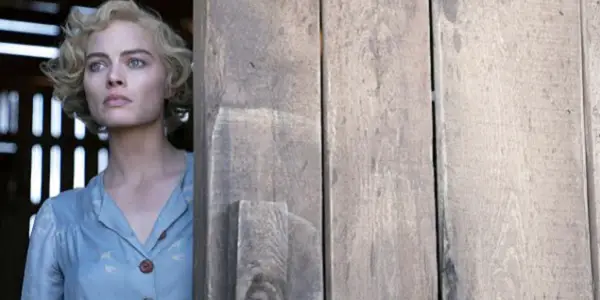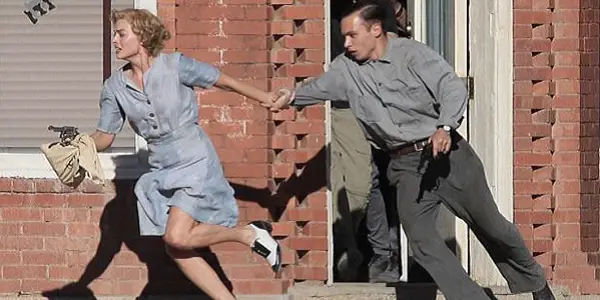DREAMLAND: Margot Robbie Robs Banks and Steals Hearts

Lee Jutton has directed short films starring a killer toaster,…
Thanks to her powerful screen presence, transformative acting ability, and timeless beauty, Margot Robbie is the rare 21st-century actor who can show up in a film set during pretty much any time period without seeming out-of-place. In Dreamland, which Robbie also produced through her LuckyChap Entertainment shingle, she’s dropped into the middle of 1930s Texas as fugitive bank robber Allison Wells, a Bonnie who finds her unlikely Clyde in the former of a wannabe bounty hunter played by Peaky Blinders’ Finn Cole. Robbie is perfectly cast as a complex woman whose outlaw glamour belies her inner darkness, and it is around her that the rest of the film slowly revolves.
Dust and Daydreams
Eugene Evans (Cole) spends most of his life engulfed in fantasy, though one cannot blame him too much considering the economic strife that plagues his small Dust Bowl town. When he’s not stealing and hoarding pulpy detective comics in his family’s empty barn, he’s fantasizing about getting out from under the oppressive thumb of his stepfather, local deputy George Evans (Travis Fimmel), and finding his birth dad, who abandoned Eugene and his mother (Kerry Condon) many years ago for the bright sun and sparkling blue water of the Gulf of Mexico.
Eugene has the chance to make at least one of these dreams a reality when he learns that notorious bank robber Allison Wells has been seen in the area, with a $10,000 bounty on her head due to the trail of bodies she has left in her wake. Desperate for money and excitement, Eugene decides to track her down. But before he can make any headway in his search, Allison shows up in his barn with a bullet hole in her leg, claiming she’s not the heartless killer the authorities have made her out to be and begging Eugene for help. Needless to say, it’s all too easy for Eugene to fall under the spell of a beautiful woman who appears to have walked straight out of the pages of his books and into his life.

Allison tells Eugene that if he can get her a car so she can drive to Mexico, she’ll reward him with double the bounty on her head. Eugene is all too willing to help, but only if he can go with her. In love with Allison — or at least, in love with the idea of her that she has fed him for her own benefit — Eugene is willing to risk it all to help her escape, all the while hoping that once they arrive in Mexico, he can potentially track down his father. Naturally, it’s only a matter of time before Eugene realizes that the harsh reality of his new life as an outlaw only bears a passing resemblance to the romantic escapade he envisioned.
Mad for Malick
While the initial comparison one might make is to the classic outlaw romance Bonnie and Clyde, the biggest influence on Dreamland director Miles Joris-Peyrafitte and screenwriter Nicolaas Zwart appears to be the cinema of Terrence Malick. The film contains echoes of Malick’s debut feature, Badlands, starring Martin Sheen and Sissy Spacek as two young people in love and on the run, and his dreamlike second film, Days of Heaven, starring Richard Gere and Brooke Adams as another set of young lovers trying to find a way out of trouble while working as farm laborers in the Texas panhandle. (Needless to say, it cannot hold a candle to these classics, but one does appreciate the effort.)
In particular, Dreamland’s earnest voiceover, courtesy of Eugene’s younger sister Phoebe (played by Darby Camp as a young girl and voiced by Lola Kirke as an adult), is clearly influenced by the rambling narration of Linda (Linda Manz), the younger sister of Gere’s character in Days of Heaven. However, Phoebe’s nostalgic telling of her brother’s story lacks the abstract beauty of Linda’s mostly improvised monologues and doesn’t really add much to the film apart from really emphasizing how much these filmmakers like Terrence Malick.
In certain pivotal moments in Dreamland, Eugene’s reality is cut with flashes of both his dreams and his nightmares: Allison in a bathing suit about to jump into the clear blue ocean, a dead rabbit being skinned by his harsh stepfather. It’s an intriguing choice that pays off in allowing us a keener glimpse into Eugene’s inner life and the moments that haunt him. Combined with the soft glow of Lyle Vincent’s cinematography and the haunting twang of avant-garde composer Patrick Higgins’ score, the resulting film has a deeply introspective vibe that is altogether very different from the rock and roll rebel lifestyle portrayed in Arthur Penn’s Bonnie and Clyde. Yet that reference is still relevant here, for that appears to be exactly what Eugene thinks his life with Allison will be.
Marvelous Margot
Like someone who has watched too many gangster movies and has convinced himself that he too could rob a bank without getting caught, the stories Eugene devours have convinced him that being on the run with a tough-as-nails dame is something romantic and exciting. Instead, he finds himself struggling to deal with jealousy as Allison employs her substantial charm on other men in order to get their way, and when he accompanies her on a robbery to re-up their rapidly dwindling funds, he finds himself extremely out of his depth.

Cole’s portrayal of Eugene is occasionally quite annoying; in many scenes, he comes off as a whiny boy ready to throw his toys out of the pram for things not going his way. (It’s easy to see why Allison keeps calling him “kid,” which is yet another thing that he whines about.) Yet that is not a problem with Cole’s performance; it’s how the character is written. And while it might be irritating, it also feels very realistic. Eugene is not the (anti)hero he or even his sister Phoebe want him to be. That would be Allison, who is so far out of Eugene’s league that it’s no wonder he can barely keep up.
Despite having a face full of modern makeup, including eyebrows that are far too well-groomed to have ever been on the run, Robbie is still spectacular as the tough-talking, no-nonsense Allison. It’s thrilling to watch her weave her story in such a way that Eugene ends up wrapped so tightly around her finger that she’d have to cut the whole thing off in order to be rid of him. Even as she paints herself as a victim of misfortune who is just doing what was necessary in order to survive, it’s clear — to the audience, if not to Eugene — that she is far more complex than such easily peddled stereotypes. She lives according to her own rules, making no apologies for those she hurts along the way. Not every actor would have the natural charisma to pull off such a performance, but Robbie makes it look easy. It is her presence that ensures Dreamland’s baggy second half doesn’t collapse.
Conclusion
Despite some flaws, including that aforementioned narration and some subpar costuming and set design that screams low-budget to the point of being distracting, Dreamland works as a vehicle for Margot Robbie’s substantial star power.
What do you think? What are your favorite movies about lovers on the run? Share your thoughts in the comments below.
Dreamland opened in select theaters in the U.S. on November 13, 2020, and will be available on demand beginning November 17, 2020. You can find more international release dates here.
Watch Dreamland
Does content like this matter to you?
Become a Member and support film journalism. Unlock access to all of Film Inquiry`s great articles. Join a community of like-minded readers who are passionate about cinema - get access to our private members Network, give back to independent filmmakers, and more.
Lee Jutton has directed short films starring a killer toaster, a killer Christmas tree, and a not-killer leopard. Her writing has appeared in publications such as Film School Rejects, Bitch: A Feminist Response to Pop Culture, Bitch Flicks, TV Fanatic, and Just Press Play. When not watching, making, or writing about films, she can usually be found on Twitter obsessing over soccer, BTS, and her cat.













